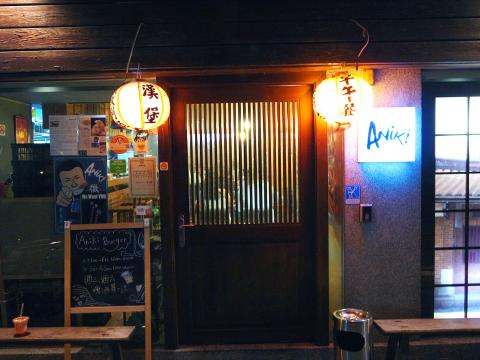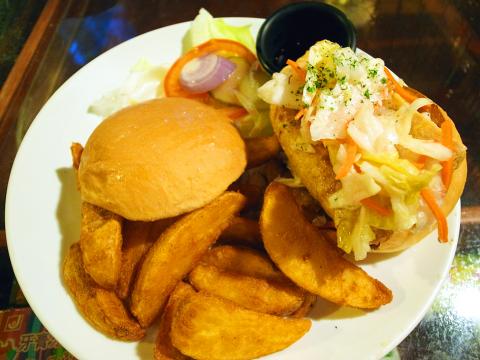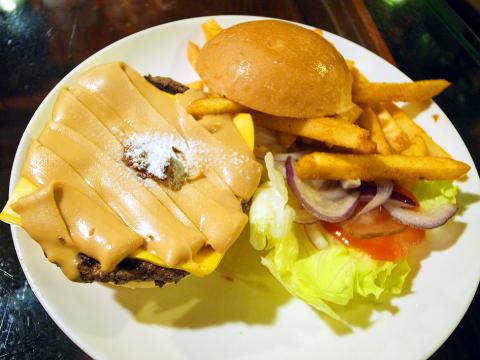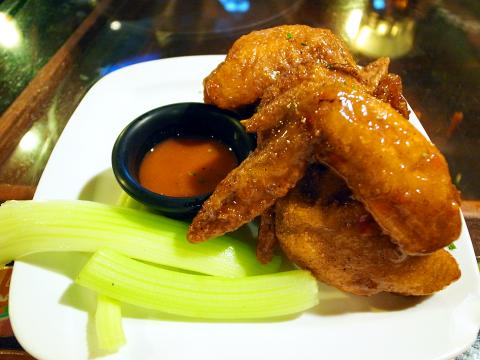Who on earth would want to eat a stinky tofu burger? Quite a few souls, apparently. Otherwise, it probably wouldn’t remain on the menu at Aniki Burger, a lively establishment that looks Taiwanese but serves an all-American menu.
Well, almost all-American.
Aniki, which means big brother in Japanese, is notable for its innovative fusion fare. For example, the restaurant boasts three types of hybrid burgers — enough, perhaps, to make novelty-seeking urbanites squeal with joy.

Photo: Ho Yi, Taipei Times
During my visit on a recent Sunday evening, the restaurant was packed with a predominantly younger crowd. A Google search reveals that it is also popular with food bloggers and reporters.
From the outside, the small storefront looks nothing like your usual burger joint, instead resembling an izakaya (Japanese tapas bar). A couple of red lanterns hang over the entrance, with the Chinese characters for hamburger (漢堡) written on one of them. Inside, the slightly cluttered space is adorned with Taiwanese knickknacks and memorabilia. Some of the tables are made out of retro Plinko games that customers can actually play — a fun way to stay occupied while waiting for your meal.
Aniki’s menu is quite extensive. The burger section alone contains a plethora of fish and chicken sandwiches such as the tartar sauce fish burger (酥脆塔塔魚排漢堡, NT$240),Thai sweet-and-spicy chicken burger (泰式酸辣雞腿漢堡, NT$260) and Indian curry chicken burger (印度咖哩雞腿漢堡, NT$250).

Photo: Ho Yi, Taipei Times
My dining partner couldn’t wait to bury his face into Aniki’s signature peanut butter burger (香濃花生醬牛肉漢堡, NT$250). It came on a toasted bun with a thin layer of rich peanut butter that nicely complemented the tender patties. Though decent, it wasn’t particularly impressive.
The fried beef burger (爆漿酥炸牛肉漢堡, NT$280) is another popular choice. It is said to literally explode with juiciness in your mouth.
For novelty’s sake, I ordered the fried tofu burger (酥炸豆腐堡, NT$240) from the Taiwanese-American fusion section of the menu. It consisted of fried tofu and Taiwanese pickled cabbage stacked on a bun. Those who cringe at the smell of stinky-tofu vendors at night markets can rest assured that the tofu is not stinky at all. The downside is that the homemade sauce makes the bun undesirably pulpy.

Photo: Ho Yi, Taipei Times
If I ever visit the restaurant again, I have my eye on another Taiwanese-style burger that consists of pineapple, prawns and mayo (鳳梨蝦球堡, NT$250). However, I have my doubts about the boiled pork with garlic sauce burger (蒜泥白肉堡, NT$250) — the name alone is enough to dampen my appetite.
Patrons not in the mood for burgers can choose from a wide variety of sandwiches, risotto and pasta as well as brunch items, including several variations of Eggs Benedict and omelets. These entrees cost between NT$230 and NT$290.
Aniki also offers a solid range of appetizers, including fried calamari (NT$180), fried mushrooms (NT$180), onion rings (NT$130) and Mexican-style French fries with cheese (NT$150). The Aniki wings (阿尼基香辣雞翅, NT$180) I tried were slathered with sweet-and-spicy sauce, making the wings moist and my fingers sticky.

Photo: Ho Yi, Taipei Times
For the night crowd, Aniki carries Taiwan Beer, Heineken, Corona and Stella Artois (NT$100 to NT$120). Those with a sweet tooth can dive into an ocean of milk shakes (NT$120 to NT$150) and ice cream (NT$80 to NT$100).
Aniki Burger has another location at 13, Daren 2nd St, Taoyuan City (桃園市大仁二街13號). Tel: (03) 436-2223.

April 28 to May 4 During the Japanese colonial era, a city’s “first” high school typically served Japanese students, while Taiwanese attended the “second” high school. Only in Taichung was this reversed. That’s because when Taichung First High School opened its doors on May 1, 1915 to serve Taiwanese students who were previously barred from secondary education, it was the only high school in town. Former principal Hideo Azukisawa threatened to quit when the government in 1922 attempted to transfer the “first” designation to a new local high school for Japanese students, leading to this unusual situation. Prior to the Taichung First

Chinese Nationalist Party (KMT) Chairman Eric Chu (朱立倫) hatched a bold plan to charge forward and seize the initiative when he held a protest in front of the Taipei City Prosecutors’ Office. Though risky, because illegal, its success would help tackle at least six problems facing both himself and the KMT. What he did not see coming was Taipei Mayor Chiang Wan-an (將萬安) tripping him up out of the gate. In spite of Chu being the most consequential and successful KMT chairman since the early 2010s — arguably saving the party from financial ruin and restoring its electoral viability —

The Ministry of Education last month proposed a nationwide ban on mobile devices in schools, aiming to curb concerns over student phone addiction. Under the revised regulation, which will take effect in August, teachers and schools will be required to collect mobile devices — including phones, laptops and wearables devices — for safekeeping during school hours, unless they are being used for educational purposes. For Chang Fong-ching (張鳳琴), the ban will have a positive impact. “It’s a good move,” says the professor in the department of

Article 2 of the Additional Articles of the Constitution of the Republic of China (中華民國憲法增修條文) stipulates that upon a vote of no confidence in the premier, the president can dissolve the legislature within 10 days. If the legislature is dissolved, a new legislative election must be held within 60 days, and the legislators’ terms will then be reckoned from that election. Two weeks ago Taipei Mayor Chiang Wan-an (蔣萬安) of the Chinese Nationalist Party (KMT) proposed that the legislature hold a vote of no confidence in the premier and dare the president to dissolve the legislature. The legislature is currently controlled